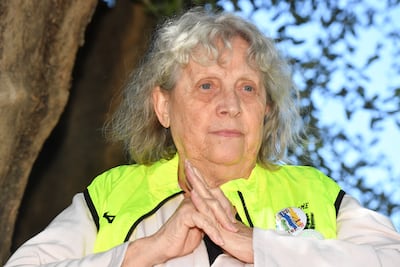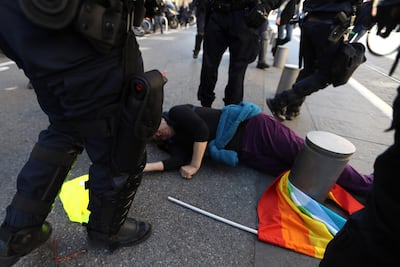With her rainbow-coloured peace flag and mild disposition, Genevieve Legay posed no obvious threat to public order when she joined an anti-government rally by the Yellow Vests in the resort city of Nice.
But what happened next, one Saturday in March 2019, made her an unlikely symbol of that French rebellion and resistance to the government and police response.
Although the details remain in dispute, Ms Legay fell during a police charge.
She believes she was struck from behind with a police baton but the officer said to have caused her to fall says this is untrue, and that he took part in a legitimate charge at a banned demonstration on a superior’s orders.
Ms Legay suffered five fractures of the skull and one of the coccyx. She has been left with no sense of smell and a limited sense of taste, and existing problems with her hearing and sight have worsened.
Throughout the campaign of disruption by protesters intent on bringing down Emmanuel Macron’s presidency, police were accused of using excessive violence.
In the first three months, from November 2018 to January 2019, the protests led to 10 deaths. Most died at barricades when motorists ran over demonstrators blocking traffic, or crashed into stationary vehicles.
Numbers vary, but other deaths linked directly or indirectly to the movement have occurred since.

One female protester was killed when a frustrated motorist tried to force her way through, and an elderly woman in Marseille died when she was hit in the face by a tear gas grenade fired by police as she closed the shutters of her fourth-floor flat.
At that point, 1,700 demonstrators had been hurt, 94 of them seriously, as had 1,000 police officers and gendarmes. By March 2019, the combined figure for those injured was 4,000.
Painful legacy
Ms Legay fell to the ground when officers advanced to disperse the demonstrators. She was knocked unconscious, waking in hospital nearly seven hours later.
The police charge was later ruled to have been disproportionate.
Divisional leader Rabah Souchi, already demoted and moved to another area, has been charged with "complicity in voluntary violence," an allegation he denies. The officer who caused her to fall has given a statement rejecting allegations against him, stating he took part on the charge against illegal demonstrators on a superior’s orders.

Many protesters suffered far worse fates than Ms Legay, losing limbs or eyes. But her experience was sufficiently dramatic to turn her into a cause celebre.
A veteran of lifelong activism for left-wing, radical and environmental causes, she describes the physical consequences of her encounter with the firm policing of peaceful but unlawful demonstrations.
Ms Legay has since required about 100 sessions of physiotherapy because of poor balance and still sees a psychiatrist once a week. She says the trauma can be traced directly to a "baton striking my head".
"The doctors tell me my experience has accelerated the ageing process," she said.
Personal sacrifice
When the Yellow Vests, or gilets jaunes, movement was launched in November 2018, Ms Legay, who has worked in education and with disadvantaged children, was initially put off by its far-right influences.
Supporters of the populist National Rally (formerly Front National) leader Marine Le Pen, and her breakaway former right-hand man, Florian Philippot, were enthusiastic early members of the movement.
“I thought it was just the [fascists] back on the street,” Ms Legay says. “Then I realised it went far beyond them. These were ordinary people who couldn’t make ends meet. It was a cause worth fighting for.”
She is furious that Mr Macron not only wished her a swift recovery but urged her to develop “a form of wisdom”.
“I was peacefully defending the constitutional, democratic right to protest,” she says.

Cold reflection
Deciding to champion the Yellow Vests was easy, she says, because so many of those demonstrating felt overwhelmed by rising costs and a falling standard of living.
“There is no shame in being poor, just in being the cause of poverty,” Ms Legay says.
Bitter experience has not deterred her from taking to the streets, although she has stepped down from her role as regional spokeswoman for the activist group Attac.
Ms Legay has declined to be immunised against Covid-19 and opposes compulsory vaccination to work in health care or enter some public places, but says she is not anti-vax.
“I joined one demonstration but there were too many from the far right,” she says.
“But with the gilets jaunes, their grievances were legitimate. In a rich country like France, the fifth or sixth world economic power, it is shameful that it is estimated according to one article that we have 10 million poor people.
"Yet for four months, up to the day I was injured, we demonstrated peacefully, no overturned rubbish bins, no broken windows, and we didn’t deserve the treatment we received.”


